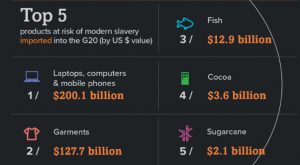February 25, 2019, by sustainablenottingham
What if modern slavery is funding fast fashion?
Guest post by Amelia Watkins, director of UoN Against Slavery, for Fairtrade Fortnight 2019 at The University of Nottingham.
Our world is broken. Oxfam reported that the top 26 people in the world own the same amount of wealth as the bottom half of humanity. In this bottom half of humanity, the ILO cited poor working conditions as a leading issue. And for this bottom half of humanity, these poor working conditions amount to modern slavery for 40.3 million people according to the Global Slavery Index.

According to the Global Slavery Index in 2018, garments were one of the top products at risk of modern slavery.
But this broken world is so far away from my life as a 3rd year UoN student. The truth is that I am nowhere near this bottom half of humanity, and in my uni bubble there isn’t much space to think about it. I’m not a slaveholder and I’m not responsible for this injustice. And even if I was, these stats are contested, the term modern slavery is criticised anyway…
But what if modern slavery is funding fast fashion? Today I’m wearing a Zara jumper, Topshop jeans and converse. Predictable stuff. But where does all this stuff get made? Or more specifically, who is making my cheap clothes?
The truth is that exploited people living in poverty are making my clothes. From cotton growing to garment manufacturing, Know The Origin found that human trafficking is prevalent in the world of fast fashion. And it is closer to home than I realised. The Financial Times found factory workers in Leicester being paid £3 an hour making clothes for New Look and Missguided.
So, I am not so detached from the bottom half of humanity. Instead I am detached from the supply chain of my wardrobe. I have become obsessed with keeping up with the trends at the cost of the human rights. And to be honest, learning this is uncomfortable. I have grown up in a world that has taught me to shop for a bargain, and not to question where my clothes come from. As a society we are buying more for less, and it is addictive. It doesn’t feel close to home and to step out of the world of fast fashion would mean missing out.
But as consumers we have influence. Buying is a moral act; everything we buy casts a vote for the kind of world we want. The Fashion Revolution urge us to shift the way we think about fashion. What if we buy less for more? What if we buy from ethical, transparent companies? What if who makes our clothes becomes as important as our own consumeristic habits?
Our world is broken, but as consumers we do have power to change it.
Amelia is the director of UoN Against Slavery. Search @uonagainstslavery or go to nottingham.ac.uk/go/nrp to find out more and get involved.
No comments yet, fill out a comment to be the first

Leave a Reply